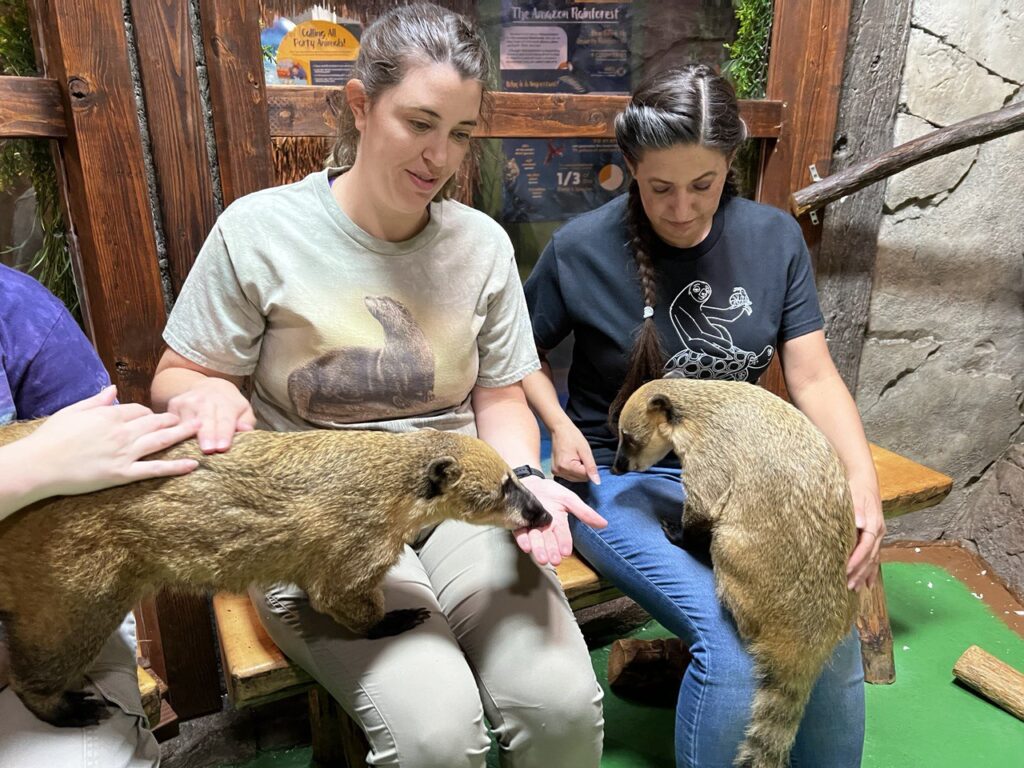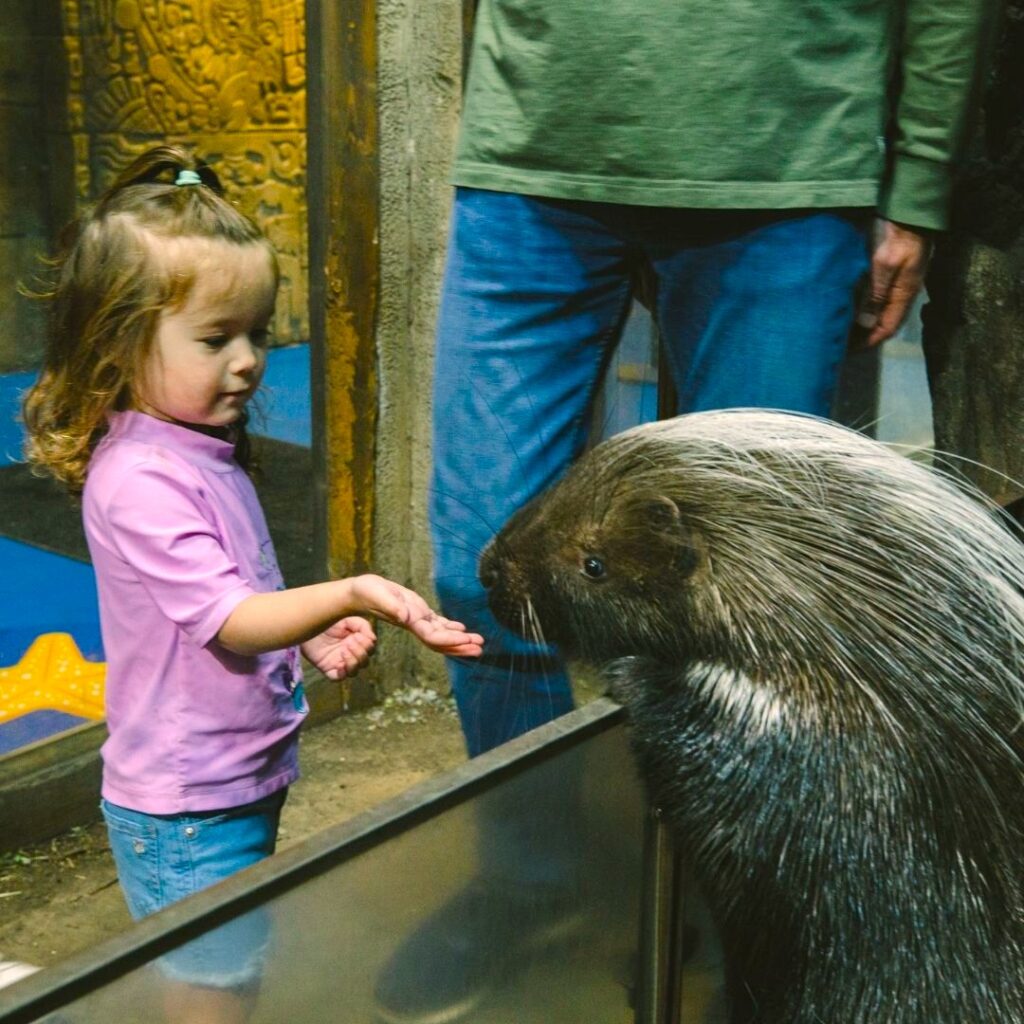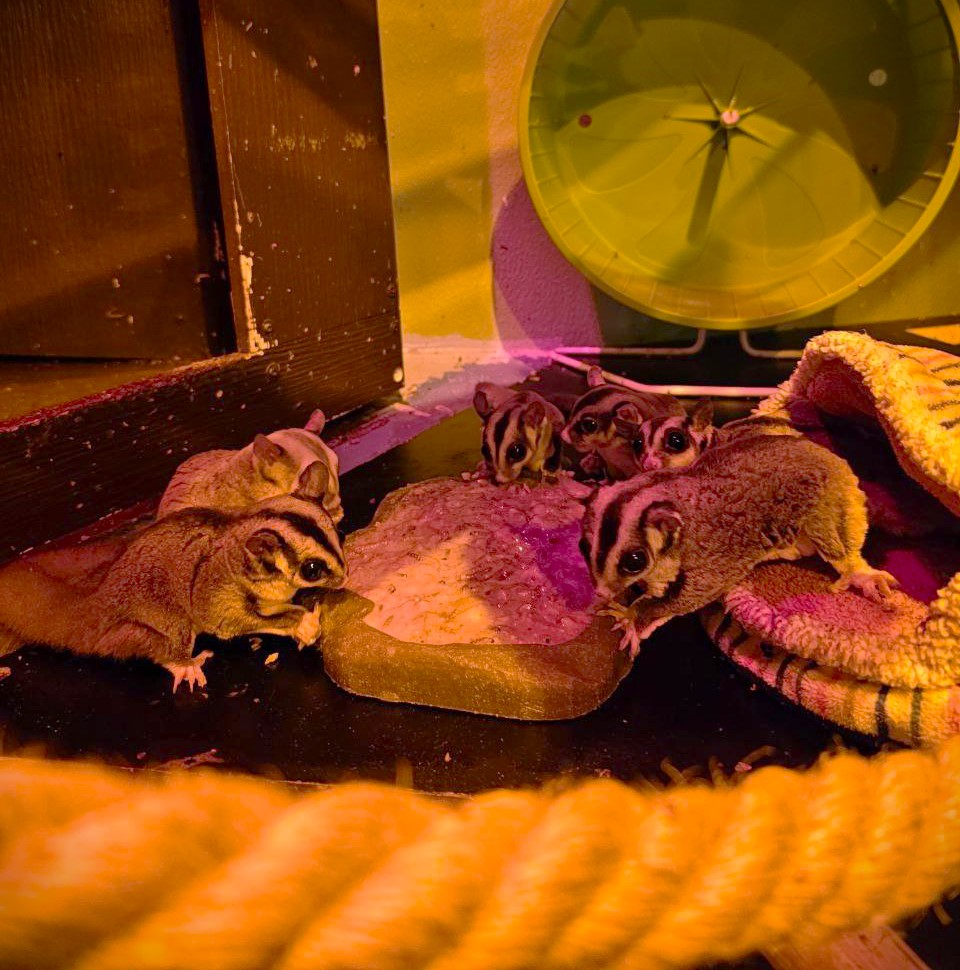How Are Opossums at SeaQuest Cared For?
Share it on:
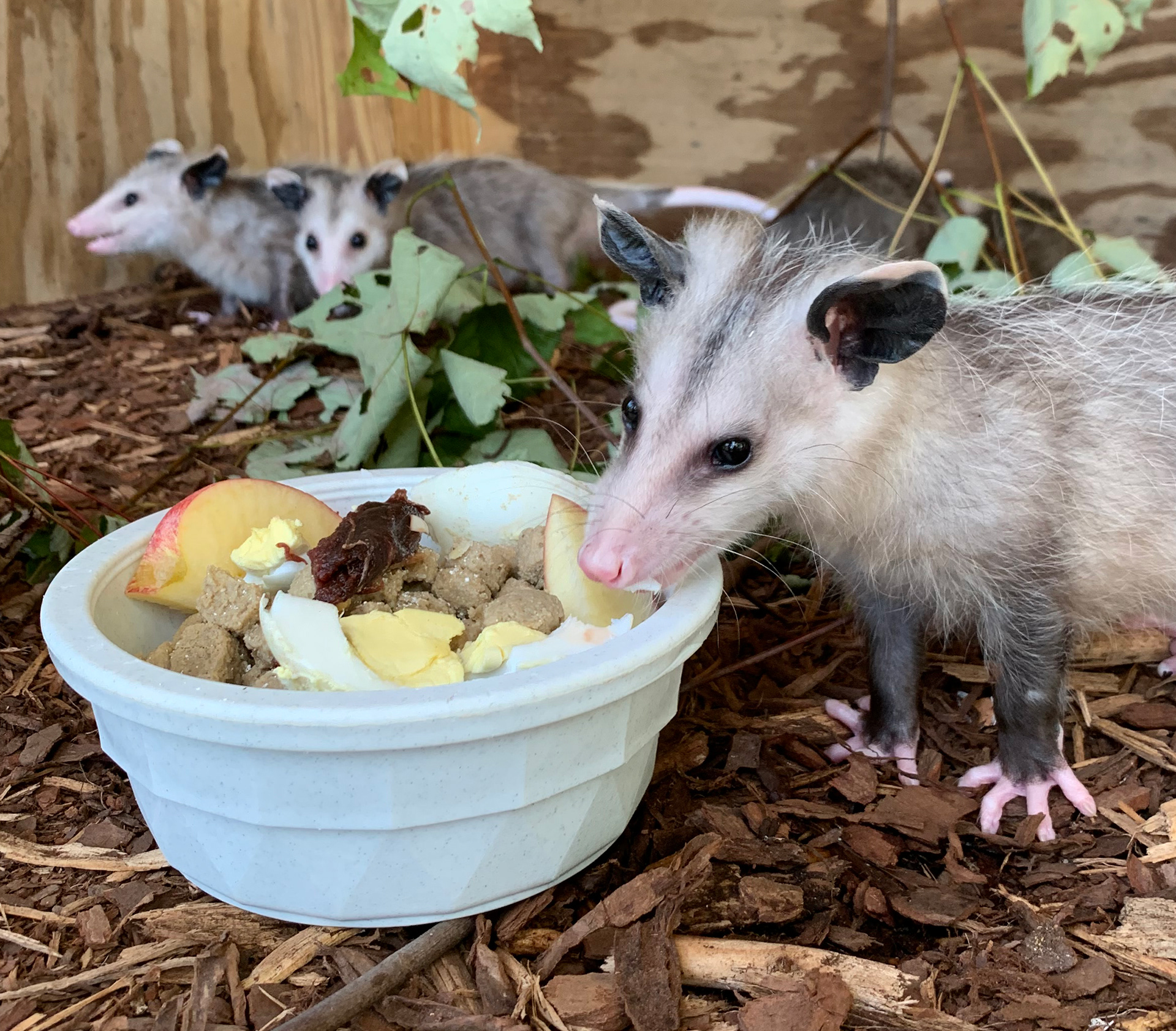
Many people in the United States see opossums as pests. Some may think they spread disease when, in reality, opossums are the opposite of the nuisance that these myths make them to be.
Opossums are incredibly resistant to rabies and actively prevent Lyme disease by eating carriers such as ticks and other insects. We celebrate these resilient creatures’ essential role in the North American environment. Despite their resiliency, opossums require specific care, to which SeaQuest is highly dedicated.
Opossum Care at SeaQuest
SeaQuest has a detailed protocol that supports the health and safety of not only opossums but all of its animals. This approach enriches the animals’ experience and helps visitors build an understanding and appreciation for these misunderstood animals.
To enact these protocols, a special team of veterinarians, biologists, and animal care specialists works together to provide a scientifically informed and ethically sound care routine. We also retrain our staff to keep them updated on the latest in marsupial care and welfare standards so we can provide the best care possible.
By illustrating our care of these animals and educating visitors about their species, SeaQuest actively participates in conservation, which helps opossums in the wild. By prioritizing these animal care and conservation standards, SeaQuest can focus on making our opossums’ lives exceptional.

Use Code BLOG25 for 25% OFF Any Admission Ticket
Understanding Opossums: Natural Behaviors and Habitats
To understand how and why we care for opossums the way we do, we must first understand how opossums operate in the wild. The better we understand their natural environment, the better we can mimic it in captivity.
What Is an Opossum’s Natural Habitat?
Opossums are native to most wooded areas in North America, primarily where they can easily find a water source nearby, such as a creek, river, lake, pond, or other marshy areas. Although they live in any area with this environment, they prefer farmland areas where they can feast on plenty of insects and hide in the brush.
Due to recent deforestation and habitat loss in North America, many opossum populations have migrated to cities and suburban areas for shelter and food, leading many to view the animals as pests due to the inconvenience.
However, these animals are only seeking shelter. After all, they will build their nests and burrow in small caves, trees, brush, rock piles, and small buildings to raise their young and stay safe from predators and the elements.
Social Interactions and Solitary Behaviors
Although opossums do live and appreciate living in solitary since they’re easily skittish, they are complex social marsupials. Recent research indicates that they even den with other opossums.
Recognizing the importance of social health for these marsupials, we’ve designed the opossum enclosure with both communal and private spaces in mind. Opossums can then choose when to interact with their peers, promoting a more natural behavior pattern. With multiple hiding spots and quiet areas, though, opossums can retreat if they want more solitude.
Diet and Nutrition: What Do Opossums Eat?
Opossums are quintessential omnivores, and their diet exemplifies their adaptability and scavenging nature. In the wild, these marsupials consume a varied diet, including carrion, insects, fruits, nuts, and small mammals. This dietary flexibility is crucial to their survival, allowing them to thrive in diverse environments and conditions. As scavengers, opossums also play an essential role by regulating insect populations and freeing habitats of decaying matter.
SeaQuest aims to mimic this diet as much as possible by providing high-quality protein sources and a variety of fruits and vegetables that provide essential vitamins and minerals.
We also carefully consider how we provide these meals. We aim to enrich opossums’ lives by providing enough variety in their food to excite them and prevent boredom. Typically, we rotate various fruits, vegetables, and protein sources throughout the day and year. Additionally, we vary their feeding methods to keep their foraging instincts sharp.
Opossums at SeaQuest also receive dietary supplements like vitamins and minerals tailored to their specific health needs. We carefully measure and give these supplements to each opossum individually to prevent any nutritional deficiencies that could arise in a controlled environment.
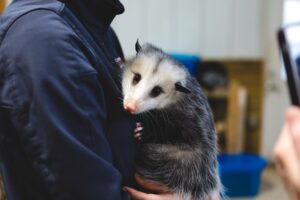
Opossum at SeaQuest
Ensuring the Health and Well-being of Opossums
The health and well-being of our opossums take top priority. Every action SeaQuest makes is for the betterment of our animals and their conservation as a species. To maintain our standards, we take the following steps:
Mental Stimulation and Physical Exercise
We design our enclosures around their natural behaviors to prioritize our opossums’ health and happiness. For example, SeaQuest will provide climbing structures and ample space for opossums to roam, which not only provides the physical exercise needed to prevent health conditions associated with inactivity but is also mentally stimulating. We don’t stop there, either. We use various enrichment tools like puzzle feeders and hide their food around the enclosure to encourage their foraging and scavenging behaviors.
In addition, we aim to provide as calm and stress-free an environment as possible to accommodate our opossums’ skittish nature. In and around their enclosures, opossum care specialists will avoid loud noises or sudden movements. We also provide buffers to external stressors, such as noise created by visitors, so that the opossums can rest.
We also carefully manage all of our opossums’ exposure to visitors and gradually introduce them to the public. This creates positive associations within the experience of training opossums, helps deter stress, and fosters a comfortable and safe environment.
Animal care specialists will take immediate action if an opossum shows signs of distress, whether in its interactions with visitors or in its enclosure. We can easily do this by maintaining a regular observation schedule where an animal care specialist is always on hand to feed opossums, clean their enclosures, and provide mental and physical stimulation to them.
Veterinary Care and Health Monitoring
A significant aspect of maintaining the health of our opossums comes from preventative and regular health treatments from our veterinarians. Our experts provide detailed and regular check-ups, including physical examinations, dental care, and vaccinations. This way, we can catch a health condition early before it escalates.
SeaQuest provides advanced veterinary technology for an accurate diagnosis and a follow-up treatment plan if an opossum develops a health condition. This technology includes digital radiography, ultrasound, and in-house laboratory tests that allow for rapid and precise assessment of health conditions. With this technology, we can effectively and quickly treat any opossums under our care.
Because of these veterinary standards, SeaQuest has the resources and staff to rehabilitate opossums that have fallen ill as pets or in the wild. These animals receive personalized treatment and rehabilitation plans, including physical therapy, specialized diets, and enrichment activities, which may expedite their recovery outcomes rather than surviving in the wild or at home.

Opossum and Opossum Babies
Educational and Conservation Initiatives
Although we prioritize the care of opossums in our care first and foremost, we understand that the care for opossums as a species sprouts from conservation efforts. Let’s look at a couple of ways that SeaQuest prioritizes conservation efforts.
SeaQuest’s Role in Opossum Conservation and Rehabilitation
While opossums are not currently classified as endangered on the IUCN List of Threatened Species, habitat encroachment does affect their natural behaviors. Urban development, deforestation, and changes in land use push these adaptable animals toward more urban environments. Instead of their traditional landscape, urban areas present multiple complications for the species, including vehicle collisions and human conflicts.
SeaQuest plays a critical role in mitigating these challenges by rehabilitating displaced opossums. The facility provides a haven for injured and orphaned opossums, where they receive comprehensive care and rehabilitation.
Through interactive exhibits and educational programs, visitors learn about the plight of opossums and the importance of conservation efforts. These programs emphasize opossums’ ecological roles, such as their contribution to controlling insect and rodent populations, and discuss ways to safely coexist with wildlife.
Destigmatizing Opossums in the Wild
As mentioned previously, many people may have preconceived notions about opossums based on the myths surrounding the species. Some may think of them as pests based on experiences where some may have found a place to nest in their homes.
However, SeaQuest aims to portray the species in a more positive light. Guests can learn about the importance of opossums in the North American environment, their challenges, and how to contribute to conservation efforts. These programs teach visitors about the opossum’s role as pollinators and their assistance keeping viruses like Lyme disease in check.
SeaQuest is responsible for preserving our wildlife’s biodiversity by providing compassionate care to these creatures and teaching others about them. This way, opossums will continue to venture into their ecosystems for generations.


